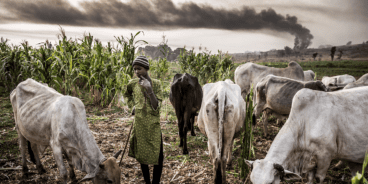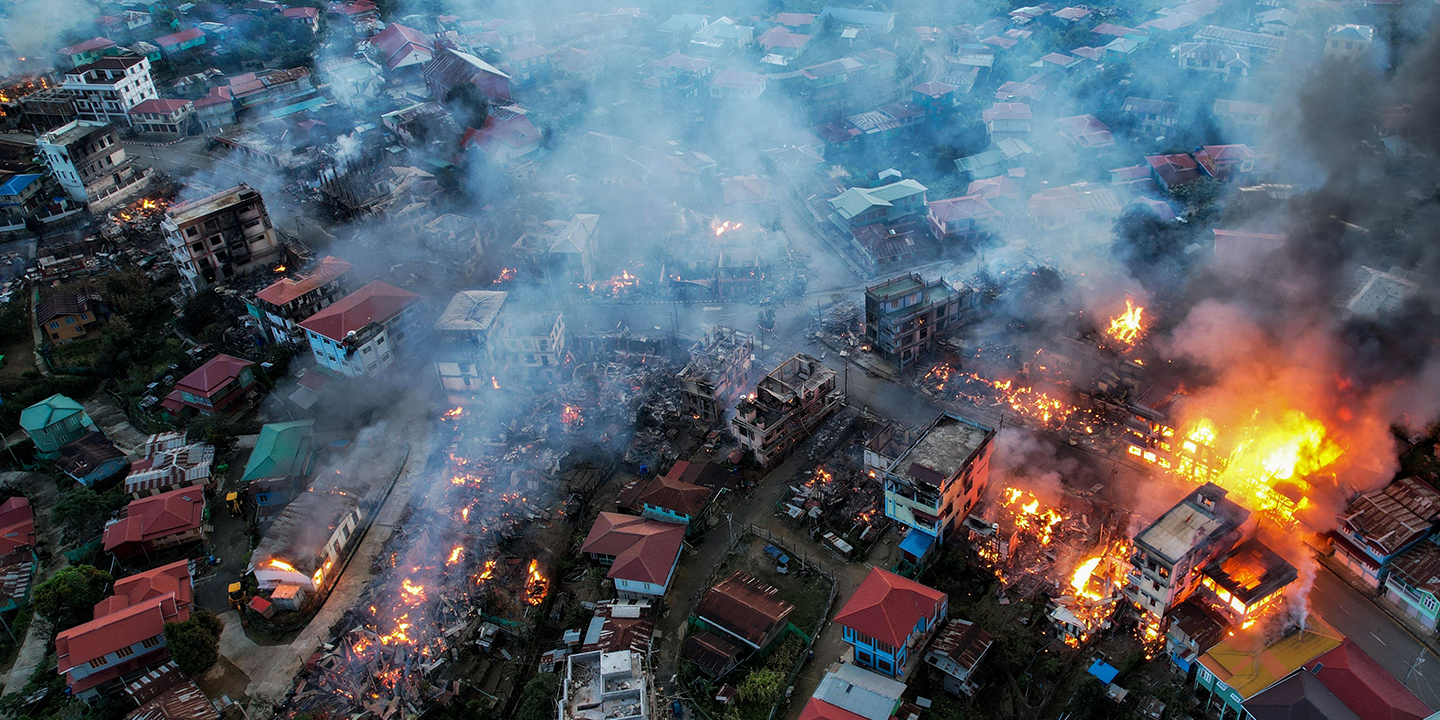

Atrocity Alert No. 293: Myanmar (Burma), Ukraine and South Sudan
Atrocity Alert is a weekly publication by the Global Centre for the Responsibility to Protect highlighting situations where populations are at risk of, or are enduring, mass atrocity crimes.
U.S. DETERMINES MYANMAR’S MILITARY PERPETRATED GENOCIDE AGAINST ROHINGYA
On Monday, 21 March, the United States (US) formally determined that the violence perpetrated by Myanmar’s (Burma) military – the Tatmadaw – against the minority Rohingya population constituted genocide and crimes against humanity. In 2016 and 2017 the Tatmadaw engaged in so-called “clearance operations” against the minority Rohingya population that were characterized by indiscriminate killings, torture, arbitrary detention, sexual violence and forced displacement. More than 350 Rohingya villages were destroyed and 745,000 people were forced to flee. The genocide followed decades of institutionalized and systematic persecution of the Rohingya by the government, which continues today.
During Monday’s announcement, US Secretary of State Antony Blinken asserted that, “the attack against Rohingya was widespread and systematic, which is crucial for reaching a determination of crimes against humanity. The evidence also points to a clear intent behind these mass atrocities – the intent to destroy Rohingya, in whole or in part.”
Many of the same military leaders who oversaw the genocidal campaign against the Rohingya, including Min Aung Hlaing, participated in the February 2021 military coup in Myanmar and continue to perpetrate atrocities against the population. According to a report released by the Office of the UN High Commissioner for Human Rights (OHCHR) on 15 March, there are reasonable grounds to believe that since the February coup the military has engaged in violations and abuses that may amount to crimes against humanity and war crimes. OHCHR reported that, “the military has bombarded populated areas with airstrikes and heavy weapons, as well as deliberately targeted civilians, many of whom have been shot in the head, burned to death, arbitrarily arrested, tortured or used as human shields.”
Echoing OHCHR’s findings, the UN Special Rapporteur on the situation of human rights in Myanmar, Tom Andrews, deplored the lack of strong, coordinated action by the international community, emphasizing that, despite being “told that the world has a ‘responsibility to protect,’ victims of atrocity crimes… the people of Myanmar see only endless expressions of concern from the international community, vague declarations that something should be done and a tedious, endless wait for a consensus to act.”
The genocide determination made by the US must be accompanied by concrete action to achieve justice for the Rohingya, as well as deter the Tatmadaw from continuing to perpetrate atrocities. Other member states should publicly recognize that Myanmar committed genocide against the Rohingya and the international community should impose punitive measures against the military. The UN Security Council should refer the situation in Myanmar to the International Criminal Court and UN member states must fully support all justice and accountability processes in relation to past and current atrocities in Myanmar. Neighboring states must take more substantial bilateral steps to respond to the ongoing crisis in Myanmar.
CIVILIAN SUFFERING DEEPENS ONE MONTH INTO RUSSIA’S INVASION OF UKRAINE
Tomorrow, 24 March, marks one month since the start of the Russian invasion of Ukraine. The conflict has unleashed a devastating crisis for civilians in many Ukrainian cities as Russian forces increasingly target civilian infrastructure. The UN has reported that over 10 million people have been displaced by the war, while an estimated 12 million remain trapped and unable to leave due to fighting. The Office of the UN High Commissioner for Human Rights has verified at least 977 civilians killed, including at least 81 children, while acknowledging that the real death toll is much higher.
Myriad abuses have been reported over the past month, including Russian troops targeting civilians and looting homes and markets, as well as unverified reports of forced deportations from Ukraine to Russia. The south eastern port city of Mariupol has been subject to an especially brutal bombardment, trapping at least 100,000 people without access to food, water, heat or electricity. Shelling has hit hospitals, schools and homes, as well as buses evacuating civilians out of the area. Russian forces have also bombed locations where populations are sheltering from the violence, including the Mariupol Drama Theater and an art school in the city that were housing hundreds of people. On 20 March Russia gave residents until 5 AM to surrender Mariupol, saying those who surrendered could leave while those who stayed would face tribunals at the hands of Russian-backed separatists. Local authorities declined, increasing fears of heavier attacks on civilians remaining in the city.
Targeted attacks on civilians and civilian infrastructure, as well as the use of indiscriminate weapons against civilians, are prohibited under international law and may amount to war crimes and crimes against humanity. If civilians have been forcibly transferred or deported to Russia, that could constitute a war crime.
Negotiations aimed at ending the conflict have reportedly progressed, but have yet to achieve a cessation of hostilities. UN Secretary-General António Guterres urged parties to the conflict to hasten the pace of negotiations, stressing that, “this war is unwinnable. Sooner or later, it will have to move from the battlefield to the peace table. The only question is: How many more lives must be lost? How many more bombs must fall? How many more Mariupols must be destroyed? How many more Ukrainians and Russians will be killed before everyone realizes that this war has no winners – only losers?”
Amidst the deepening crisis, the international community must increase its pressure on Russian authorities to halt the invasion, in line with the International Court of Justice’s provisional measures imposed last week. States should also continue to exert pressure at the UN, including through suspending Russia from the Human Rights Council.
UN REPORT HIGHLIGHTS WIDESPREAD CONFLICT-RELATED SEXUAL VIOLENCE IN SOUTH SUDAN
On 21 March the UN Human Rights Council (HRC)-mandated Commission of Human Rights in South Sudan (CHRSS) released a Conference Room Paper on conflict-related sexual violence against women and girls in South Sudan. Drawing on testimonies and interviews conducted between February 2020 and February 2022, the CHRSS concluded that conflict-related sexual violence against women and girls is widespread and systematic in South Sudan and “takes place in the context of persistent conflict and insecurity, drastic gender inequity, and prevailing impunity, which exacerbate its prevalence and contribute to its normalization.”
The report outlined that the various forms of sexual and gender-based violence, including rape, gang rape and mass rape, abductions and sexual slavery and sexual torture are not “random opportunistic incidents” but “involve high degree of planning and deliberate intention.” According to the CHRSS, these crimes stem in part from the failure of political elites to address security sector reform and to provide basic necessities to the armed forces. This contributes to a permissive environment for predatory and violent behavior against civilians.
South Sudanese armed forces, non-state armed groups, militias linked to powerful individuals or institutions, and groups involved in organized inter-communal violence have been identified as perpetrators. The CHRSS found that sexual violence has been instrumentalized as a reward and entitlement for armed actors. Near complete impunity for rape and sexual violence allows perpetrators to avoid accountability.
Yasmin Sooka, Chair of the CHRSS, declared that, “it is outrageous and completely unacceptable that women’s bodies are systematically used on this scale as the spoils of war.” Political instability and armed conflict have been pervasive in South Sudan for the majority of its almost 11 years of independence. Although the overall level of violence against civilians reduced significantly during 2021, subnational and localized violence continued, particularly in Unity, Jonglei, Lakes, Warrap and Western Bahr el Ghazal states. The CHRSS concluded that rampant conflict-related sexual violence perpetrated against women and girls cannot be isolated from wider political violence, which is often characterized by brutal violations and abuses against civilians, including killings, abductions, torture and forced displacement.
The government of South Sudan must urgently commit to the implementation of the outstanding provisions of the peace agreement, including the one aimed at halting sexual and gender-based violence. South Sudanese authorities should strengthen the judicial system and work to end impunity for all forms of sexual and gender-based violence. Given its invaluable role in monitoring and reporting on atrocity crimes and grave human rights violations in South Sudan, the HRC must renew the mandate of the CHRSS in full during the conclusion of the 49th session next week.
Related Content


